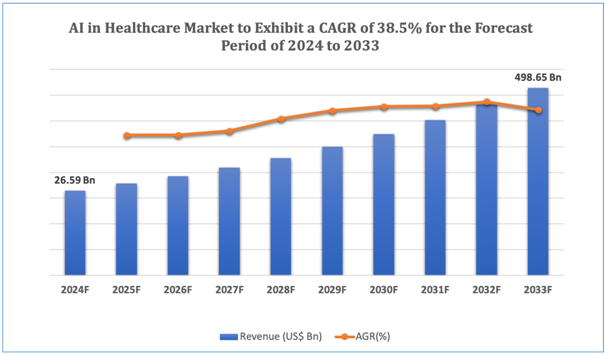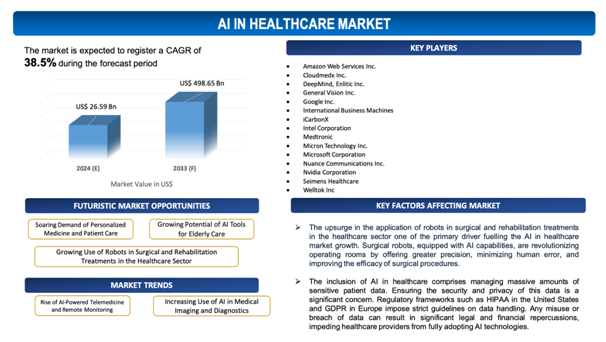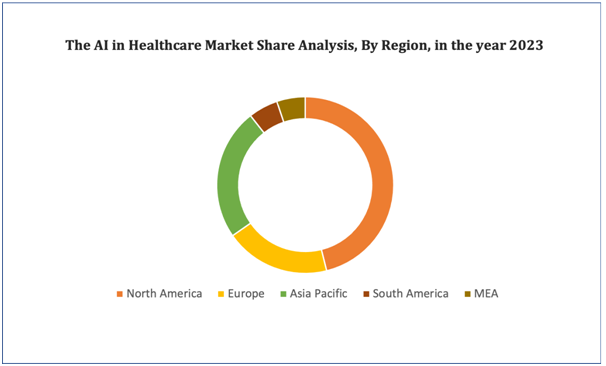Artificial Intelligence in Healthcare Market Overview
The global artificial intelligence in healthcare market is estimated to be worth over USD 498.65 Bnin 2033 and is expected to grow at CAGR of 38.5% during the forecast period (2024-2033).
AI is transforming healthcare by providingadvanced solutions across differentfields, from diagnostics to personalized treatment plans. By the evaluation of extensive amounts of medical datasets, AI algorithms can determine patterns and make projections with a level of precisionunparalleled by conventional methods. In diagnostics, AI-powered systems can decipher medical scans such as X-rays, MRIs, and CT scans, helping radiologists in discerning abnormalities and enhancing diagnostic precision. In addition, natural language processing (NLP) algorithms allow AI to extract valuable insights from unformed clinical notes, improving the efficacy of healthcare professionals in decision-making processes.
Another notable area where AI is advancing is in predictive analytics and preventive care. By leveraging machine learning algorithms, healthcare providers can anticipate patient outcomes, distinguish individuals at high risk of developing certain conditions, and interfere proactively to avoid disease advancement. This dynamic approach not only enhances patient outcomes but also minimizes healthcare costs by avoiding costly interventions and hospitalizations.
On top of that, AI is supporting the development of personalized treatment plans personalized to individual patients' unique characteristics. By scrutinizing the genetic data, patient history, and other relevant factors, AI algorithms can suggest the most effective treatments and forecast potential adverse reactions, optimizing therapeutic outcomes and minimizing adverse effects. Likewise, AI-driven virtual health assistants and chatbots are enhancing patient engagement and access to care by offering personalized health recommendations, responding queries, and scheduling appointments, thereby enhancing overall healthcare accessibility and patient satisfaction.
However, while the potential advantages of AI in healthcare are immense, challenges such as regulatory compliance, data privacy, and the ethical usage of AI-powered technologies remain substantial concerns. Nonetheless, with persistent research, development, and collaboration between healthcare professionals, data scientists, and policymakers, AI is anticipated to transform healthcare delivery, accompanyingin the age of more accessible,efficient, and personalized medical care.
Figure 1.Artificial Intelligence in Healthcare: Market Size

Get more details on this report - Request Free Sample
Key Market Insights
The global AI in healthcare market is witnessingstrong growth, fuelled by progressions in big data analytics, machine learning, and cloud computing. Significant insights reflect a rise in AI adoption for diagnostic and predictive analytics, personalized medicine, and operational efficiency.
Key developments comprise AI-powered tools for early disease detection, such as IBM Watson Health and Google's DeepMind, which are improving diagnostic accuracy and treatment outcomes. Novel technologies like natural language processing (NLP) are transforming electronic health records (EHR) management, making patient data more actionable and accessible. The incorporation of AI with medical imaging is specificallyremarkable, with companies like Zebra Medical Vision and Aidoc leading the way in offering real-time imaging solutions.
In addition, the COVID-19 pandemic has propelled AI deployment in drug discovery and telemedicine, with AI algorithms facilitating to fast-track vaccine development and manage remote patient care effectively. The market panorama is characterized by strategic collaborations between tech giants and healthcare providers, regulatory advancements, and increased investment in AI start-ups. However, challenges such as data privacy concerns, the need for extensive training datasets, and regulatory hurdles persist.
Market Dynamics
Market Drivers
Growing Use of Robots in Surgical and Rehabilitation Treatments in the Healthcare Sector
The upsurge in the application of robots in surgical and rehabilitation treatments in the healthcare sector one of the primary driver fuelling the AI in healthcare market growth. Surgical robots, equipped with AI capabilities, are revolutionizing operating rooms by offering greater precision, minimizing human error, and improving the efficacy of surgical procedures. Companies like Intuitive Surgical, with their da Vinci Surgical System, and Medtronic, with their Hugo RAS system, represent how AI-integrated robotics can assist surgeons in performing intricate operations with enhanced outcomes. These advanced robots can scrutinizeextensive volumes of surgical data, acquire knowledge from every method, and provide real-time insights, thus optimizing surgical performance and patient recovery times. In rehabilitation, AI-driven robotic systems are transforming patient care by providing personalized therapy regimens, ongoing monitoring, and adaptive assistance based on patient progress. Technologies like Ekso Bionics' exoskeletons and ReWalk Robotics' wearable robotic suits allow patients with mobility impairments to regain movement and independence, displaying AI’s role in improving rehabilitation treatments. The incorporation of AI in these robots ensures more efficient and effective patient care, fuelling demand for AI solutions in the healthcare sector. In addition, the use of AI in robotic surgery and rehabilitation mitigates the overall healthcare costs by reducing complications and hospital readmissions, further accelerating market growth. The growing adoption of AI-enabled robots indicates a move towards more intelligent and patient-centric healthcare, making it a leading driver in the expansion of the global AI in healthcare market.
Market Restraints
With regard to numerous advantages of artificial intelligence in healthcare, the market faces several challenges due to the unique characteristics and requirements associated with these potent pharmaceutical products. Some of the key market challenges include:
- Data Privacy and Security Concerns: The inclusion of AI in healthcare comprisesmanagingmassive amounts of sensitive patient data. Ensuring the security and privacy of this data is a significant concern. Regulatory frameworks such as HIPAA in the United States and GDPR in Europe impose strict guidelines on data handling. Any misuse or breach of data can result in significant legal and financial repercussions, impeding healthcare providers from fully adopting AI technologies.
- High Implementation Costs and Technical Complexity: Implementing AI solutions in healthcare requires significant investment in infrastructure, software, and skilled personnel. The initial setup costs, continuous maintenance, and the necessity for continuous training and updates can be excessively expensive, particularly for smaller healthcare providers. In addition, the technical convolutionrelated to integrating AI into existing healthcare systems can pose significant challenges, diminishing the adoption rate and deterring the market's growth.

Get more details on this report - Request Free Sample
Market Opportunity
Soaring Demandof Personalized Medicine and Patient Care
Increasing technological developmentsstands as a major market opportunity for the global artificial intelligence in healthcaremarket, propelling innovation and improving the efficiency of digital health solutions. Leading-edge technologies such as artificial intelligence (AI), machine learning (ML), and big data analytics allow the development of more sophisticated and personalized therapeutic interventions. These advancementssupport the creation of algorithms that can foretell patient behaviours, personalize treatments to individual needs, and offer real-time feedback, substantiallyenhancing patient outcomes.
For instance, AI-driven platforms can evaluatelarge amounts of patient data to determine patterns and forecast health risks, allowing for early intervention and personalized care plans. Machine learning models improve the precision of these predictions over time, continuouslyenhancing the quality of care offered. In addition, advancements in wearable technology and mobile health applications allowcontinuous health monitoring, offering patients and healthcare providers with real-time data to make informed decisions about treatment and lifestyle modifications.
Telehealth and remote patient monitoring technologies have also seen remarkable advancements, particularlyon grounds of the COVID-19 pandemic, which has accelerated the adoption of digital health solutions. These technologies allow healthcare providers to deliver care remotely, rising accessibility for patients and minimizing the burden on healthcare systems. Along with that, developments in cybersecurity measures are addressing data privacy and security concerns, making artificial intelligence in healthcaremore reliable and secure.
Market Trends
- Rise of AI-Powered Telemedicine and Remote Monitoring: The COVID-19 pandemic spurred the adoption of telemedicine, and AI is now holding a critical role in improving this trend. AI algorithms are being incorporated into telehealth platforms to offer more precise diagnoses, personalized treatment recommendations, and real-time patient monitoring. Remote monitoring devices, powered by AI, are allowing continuous health tracking, early detection of potential health issues, and timely interventions. This trend is expanding access to healthcare, specifically in remote and underserved areas, while also enhancing the efficiency and effectiveness of care delivery.
- Increasing Use of AI in Medical Imaging and Diagnostics: AI applications in medical imaging and diagnostics are swiftlydeveloping, with machine learning algorithms notablyenhancing the precision and speed of image analysis. AI tools are being developed to aid radiologists in detecting anomalies in MRIs, X-rays, CT scans, and other imaging modalities. These tools can underscore areas of concern, prioritize urgent cases, and even forecast disease progression. The integration of AI in diagnostics is not only improving the precision of medical imaging but also minimizing the workload of healthcare professionals and speeding up the diagnostic process, resulting in faster and more accurate treatment decisions.
Artificial Intelligence in Healthcare Market: Key Segments
By Offering
- Hardware
- Software
- Services
By Technology
- Machine Learning
- Context-Aware Computing
- Natural Language Processing
- Deep Learning
- Querying Method
- Others
By Application
- Robot-Assisted Surgery
- Virtual Nursing Assistant
- Administrative Workflow Assistance
- Fraud Detection
- Dosage Error Reduction
- Clinical Trial Participant Identifier
- Preliminary Diagnosis
- Others
By End User
- Healthcare Providers
- Pharmaceutical and Biotechnology Companies
- Patients
- Others
By Key Geographical Regions
- North America
- Europe
- Asia-Pacific
- Middle East and Africa
- South America
Figure 4. Artificial Intelligence in Healthcare Market: Distribution by Region

Get more details on this report - Request Free Sample
Artificial Intelligence in Healthcare Market: Regional Analysis
North America dominates the global artificial intelligence in healthcare market attributing to its improvements in healthcare IT infrastructure, increasing healthcare expenses, and broad adoption of AI/ML technologies.The market is expanding in Europe due to soaring awareness of the use of AI-based technologies and increasing demand for value-based services. In addition, over the forecast period, the Asia Pacific region is anticipated to have profitable growth. This growth rate is owing to the fast technological advancements and development as well as ventures concentrating on AI-based healthcare technology.
Leading Artificial Intelligence in Healthcare Developers
Industry Trends and Global Forecasts, 2023-2035 report features an extensive study of the current market landscape, market size and future opportunities associated with the Artificial Intelligence in Healthcaremarket, during the given forecast period. Further, the market report highlights the efforts of several stakeholders engaged in this rapidly emerging segment of the biopharmaceutical industry. Key takeaways of the Artificial Intelligence in Healthcaremarket are briefly discussed below.
The report includes the list of players operating in the global Artificial Intelligence in Healthcare market. Some of the key players include:
- Amazon Web Services Inc.
- Cloudmedx Inc.
- DeepMind, Enlitic Inc.
- General Vision Inc.
- Google Inc.
- International Business Machines
- iCarbonX
- Intel Corporation
- Medtronic
- Micron Technology Inc.
- Microsoft Corporation
- Nuance Communications Inc.
- Nvidia Corporation
- Seimens Healthcare
- WelltokInc
Artificial Intelligence in Healthcare Market: Key Developments
- In October 2023, Microsoftlaunched new data and AI solutions, Microsoft Cloud at the HLTH 2023 conference, aiming to empower healthcare organizations in unlocking insights and enhancing patient and clinician experiences.
Scope of the Report
The market report presents an in-depth analysis of the various firms / organizations that are engaged in this market, across different segments, as defined in the below table:
|
|
Key Report Attributes |
Details |
|
|
|
Base Year |
2023 |
|
|
|
Forecast Period |
2024-2033 |
|
|
|
CAGR (2024-2033) |
38.5% |
|
|
|
Offering |
|
|
|
|
Technology |
|
|
|
|
Application |
|
|
|
|
End User |
|
|
|
|
Key Geographical Regions |
|
|
|
Key Companies Profiled |
|
|
|
